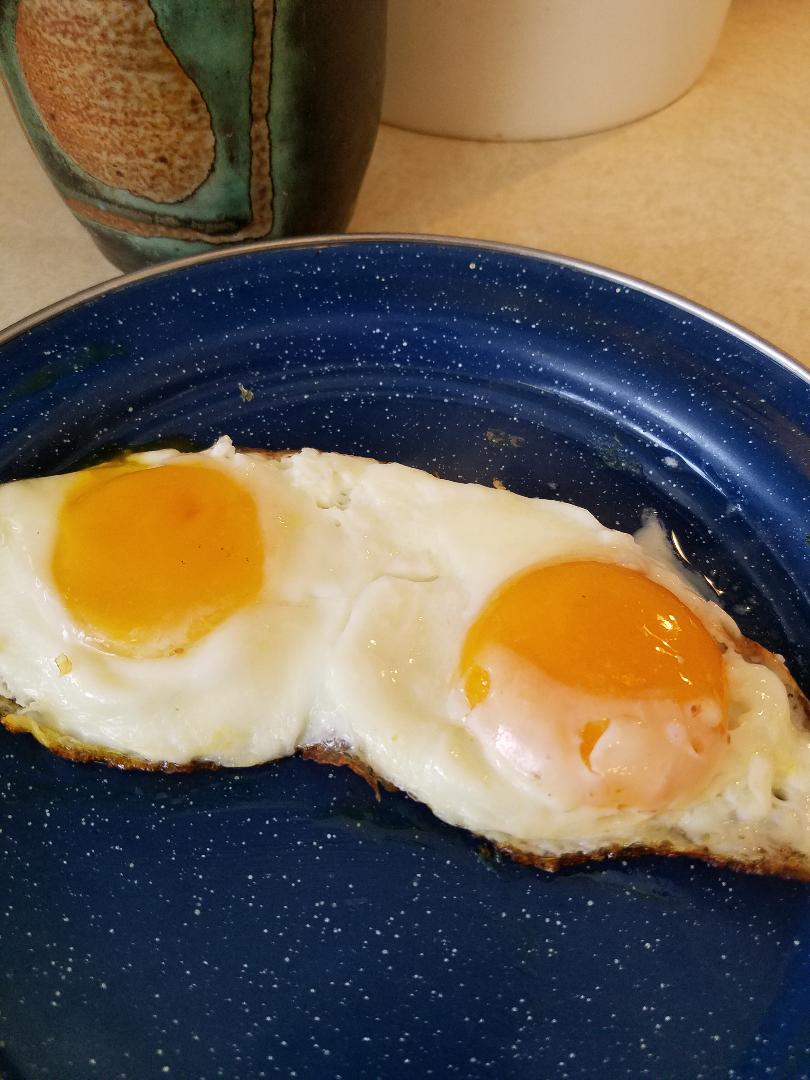Frozen Eggs
Ah Winter!

On one particularly cold January night, the egg basket sat forgotten in our garage. The result? Frozen eggcycles. Rather than toss almost 3 dozen eggs that could not be sold, I decided to experiment. Would they be any good? Could I use them as usual?
Any eggs with large cracks were discarded as I saw no need to invite unwelcome bacteria into our bodies. Those without cracks were divided into two groups. The first were rinsed and stored in a carton in the refrigerator where, after many days, they finally thawed.
One morning, in an impatient mood, I thought I would try frying a couple. After all, the dog, the cat, and I wanted to eat eggs. The finished product?

As the whites still contained plenty of ice crystals, they took longer than normal to cook. The key seemed to be “Low and Slow.” But as you can see, the end results were just fine.
The remaining eggs were placed in a basket where they sat at room temperature. Although I removed all traces of dirt, I did not soak them. This allowed their protective waterproof layer to remain intact. Thawing, was of course, much quicker and once thawed, the eggs were just…eggs. I cooked and baked with them with no noticeable differences.
So why would you purposefully want to freeze eggs? Maybe you found a great deal on them and want to load up. Perhaps you will be traveling and want to store the contents of your refrigerator until you return. Maybe you want to take some on your camping trip without the mess of broken eggshells. Or, perhaps you are food prepping and would like to freeze eggs in small portions for favorite recipes.
The American Egg Board has compiled an online, alphabetical encyclopedia about eggs. Searching though it, you will find all you could ever wish to know, including how to freeze them. Apparently, eggs can be successful frozen for up to a year. However, because they do expand their contents when frozen, it is better to crack them open and pour the contents into freezer containers. Here are some tips that they offer:
*Freeze only clean, fresh eggs and always label with the date you prepared them.
*For Egg Whites: Separate the eggs one at a time, pour into freezer containers or into empty ice cube trays. If you choose the latter, just empty each frozen compartment into a larger container and label.
*For Yolks: It is a property of eggs yolks to gel when frozen, making them difficult to use in a recipe. To help retard this this thickening, beat in 1 1/2 tsp. of sugar or 1/8 tsp. of salt per 1/4 cup of egg yolk (about 4 yolks). Then freeze in a container and label.
*Whole Eggs: Beat until blended. Pour into containers, or again, ice cube trays. Label with the number of eggs you have prepared and freeze.
To Thaw Frozen Eggs: Place containers of frozen eggs in the refrigerator overnight to thaw (I haven’t tried this but I assume they thaw more quickly without their shells) or under running water. Egg whites will beat better if you then allow them to sit at room temperature for about 30 minutes.
Frozen or not, what other questions might you have about eggs? Check out the website of the American Egg Board for answers: https://www.incredibleegg.org. Then contact me for fresh–not frozen–non-gmo, free-range eggs.
Creating your best dishes, starts with the best ingredients.

Robin—Love Led Farm


Leave a Reply
Want to join the discussion?Feel free to contribute!